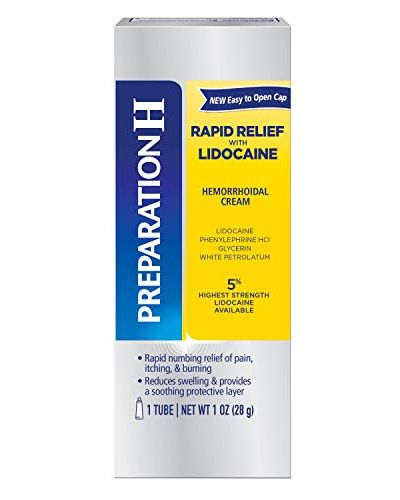Hemorrhoids Treatment Plan - 11 Ways to Get Rid of Hemorrhoids - Prevention Magazine
If you're experiencing painful hemorrhoid symptoms, you're likely wondering how to get rid of hemorrhoids—fast. After all, problems related to hemorrhoids, also known as piles, are close to the top of the list of annoying health issues. And while many of us would likely prefer not to talk about them, they're actually one of the most common health conditions. In fact, nearly three out of four adults experience related symptoms from time to time—which is only one of the many things to know about hemorrhoids.
What many people don't know is that hemorrhoids are actually something you're born with, but we typically only notice them when they start acting up, says Alex Ky, M.D., a proctologist and professor of surgery at the Icahn School of Medicine at Mount Sinai in New York. "Hemorrhoids are a mixture of arteries and veins that help cushion your anal canal during bowel movements," she explains.
"Doctors refer to symptomatic hemorrhoids as either external or internal," says Mitchell A. Bernstein, M.D., a colon and rectal surgeon and professor of surgery at the NYU Grossman School of Medicine. Internal hemorrhoids are inside your anus and painless but can cause bleeding during bowel movements. External hemorrhoids occur when hemorrhoids are pushed just outside of the anal opening. When this happens, they can swell up, bleed, and feel seriously painful, irritated, and itchy, notes Dr. Bernstein.
When such an unwelcome pain pops up, one question is top of mind: How do you get rid of hemorrhoids? Here's your guide to expert-approved hemorrhoid treatments from home remedies to in-office procedures, plus how to know when it's time to see a doctor.
Over-the-counter ways to get rid of hemorrhoids
Try topical treatments
For quick relief from painful and itchy external hemorrhoids, head to your pharmacy for an over-the-counter hemorrhoid cream or suppository that contains witch hazel (like Tucks pads) or hydrocortisone and lidocaine (such as Preparation H). Topical creams often have painkillers, numbing agents, and steroids which can dial down pain and swelling, says Harry J. Thomas, M.D., a board-certified gastroenterologist at Austin Gastroenterology in central Texas. Be sure to follow the label instructions carefully and don't take topicals for more than a week, as steroids can thin your skin over time.
Take over-the-counter pain relievers
While you're at it, consider stocking up on OTC pain relievers like acetaminophen (Tylenol) or nonsteroidal anti-inflammatory drugs (NSAIDs like aspirin and ibuprofen) and take them according to the label instructions, says Dr. Thomas. Like topicals, these meds can provide temporary relief from pain and swelling.
Home remedies for hemorrhoids
Increase fiber intake
Most of us don't get in enough fiber every day, but adding more high-fiber foods like beans, broccoli, whole grains, and fresh fruit to your diet can help you avoid constipation and stay regular. This in turn reduces the chances that you'll find yourself straining and further irritating your hemorrhoids, says Dr. Thomas. Aim for 20 to 30 g of fiber a day, and consider taking a fiber supplement that contains psyllium (Metamucil) or methylcellulose (Citrucel) to help you hit your daily goal. If you're typically low on fiber-rich foods, though, take your time—suddenly upping your intake may make you gassy.
Load up on water
When your hemorrhoids are flaring up, another simple but essential fix is to make sure you're not dehydrated. Getting in plenty of fluids (think: about 1.5 to 2 liters or about 6 to 8 cups a day) can help produce regular, soft stools and reduce straining, says Dr. Thomas. To ensure you're staying hydrated throughout the day, keep a full bottle of water by your side, add a cup of tea to your self-care routine, or freshen up your hydration game with infused water.
Ice
For short-term relief from particularly painful, swollen hemorrhoids, icing can be a highly effective solution. Apply an ice pack or cold compress to your anus for about 10 minutes up to three times a day, suggests Dr. Thomas. Of course, always remember to wrap ice inside a paper towel or cloth first. No matter how bad the pain is, you want to protect your skin.
Soak it off in a sitz bath
A sitz bath comes from the German word "sitzen," meaning "sit," and it refers to a 10- to 15-minute soak in warm water that comes just up to your bottom and hips. "Sitz baths can relieve irritation and itching as well as spasm of your anal sphincter muscles," says Dr. Thomas. Take a shallow soak in your bathtub or buy a small plastic tub from your pharmacy to give yourself a portable sitz bath two to three times a day.
Move a little more
While some exercises like weightlifting, squats, and lunges can cause or worsen painful hemorrhoids due to straining, others may help relieve your symptoms and reduce your chances of having future flare-ups. Physical exercise can help with regular bowel movements and keep pressure off of your hemorrhoids, says Dr. Thomas. Although you might not feel up to your usual workout, try taking a brisk walk or incorporating gentle movement into your day with stretching or yoga. Make it a point to break up long periods of sitting or standing, too, as both can increase pressure on your veins and irritate hemorrhoids.
Procedures
Consider having a clot removed
External hemorrhoids can result in extremely painful blood clots, and while they're not dangerous, they can take a couple of weeks to resolve on their own. If yours scores high on your personal pain scale, a doctor can remove a thrombosed hemorrhoid with a relatively simple in-office procedure under local anesthetic in about 10 minutes. Keep in mind: The first 24 to 48 hours are typically the most painful—and the best time to have a clot removed, says Dr. Ky.
Band it off
For bleeding or recurrent hemorrhoids, another minimally-invasive treatment—and one of Dr. Ky's favorites—is known as rubber band ligation. For this procedure, there's typically no need for anesthesia. Your doctor simply wraps a tiny rubber band around the base of the hemorrhoid, and with its circulation cut off, the hemorrhoid shrivels up, shrinks, and falls off, often within a week. Complications are rare, but you might feel a little pain or tightness down there. Needless to say, it's best to leave the banding to your doctor. Never try something like this at home.
Surgery
If you've tried home remedies and in-office procedures but your hemorrhoids are still making you miserable, it might be time to ask your doctor about surgery. Recovery from the surgical removal of hemorrhoids (a.k.a. hemorrhoidectomy) can be extremely painful, notes Dr. Bernstein, but it's one of the most effective ways to get rid of hemorrhoids for good.
Staples
Another surgical option is having your hemorrhoids stapled into place. This is a less painful procedure compared to a hemorrhoidectomy, but it does come with a greater risk of relapse and is not recommended if you have anal sex, as staples can cause injury, notes Dr. Ky.
What causes hemorrhoids?
While we now know that everyone has hemorrhoids due to basic physiology, symptomatic hemorrhoids (as Dr. Bernstein refers to them) often have underlying causes. Hemorrhoids can often bulge or swell due to a variety of reasons, such as:
- pressure from straining
- extended sitting time on the toilet
- chronic diarrhea
- constipation
- heavy lifting
Additionally, your risk of having hemorrhoid symptoms goes up if you're pregnant thanks to the extra weight of your baby and as you age since the tissues that support the veins around your anus can become weaker over time.
When to see a doctor for hemorrhoids
Hemorrhoids can be a big pain (literally), but thankfully, symptoms typically go away within a week. If you still have symptoms of hemorrhoids after a week of self-care measures or you're experiencing severe pain or bleeding, seek medical attention immediately, says Dr. Thomas.
It's important to note that sometimes what might seem like symptoms of hemorrhoids could indicate something more serious. Less commonly, rectal bleeding can also be a sign of diseases such as colorectal cancer or anal cancer. Make sure to get checked out if you notice large amounts of bleeding or other changes in your bowel habits like a different stool color or consistency.

Lauren Krouse is a freelance writer who covers health, domestic violence, and self-advocacy. Her work appears in _Women's Health, Men's Health, Prevention, Self, HuffPost, and elsewhere. When she's not writing, you can find her trying to meditate more, weightlifting, or walking in the woods with her partner and black lab.
Assistant Editor
Shannen Zitz is an Assistant Editor at Prevention, where she covers all things lifestyle, wellness, beauty, and relationships. Previously the Editorial Assistant at Prevention, she graduated from the State University of New York at Cortland with a bachelor's degree in English. If she's not reading or writing, you can probably find her frequenting the skincare and makeup forums on Reddit or hogging the squat rack at the gym.

Comments
Post a Comment